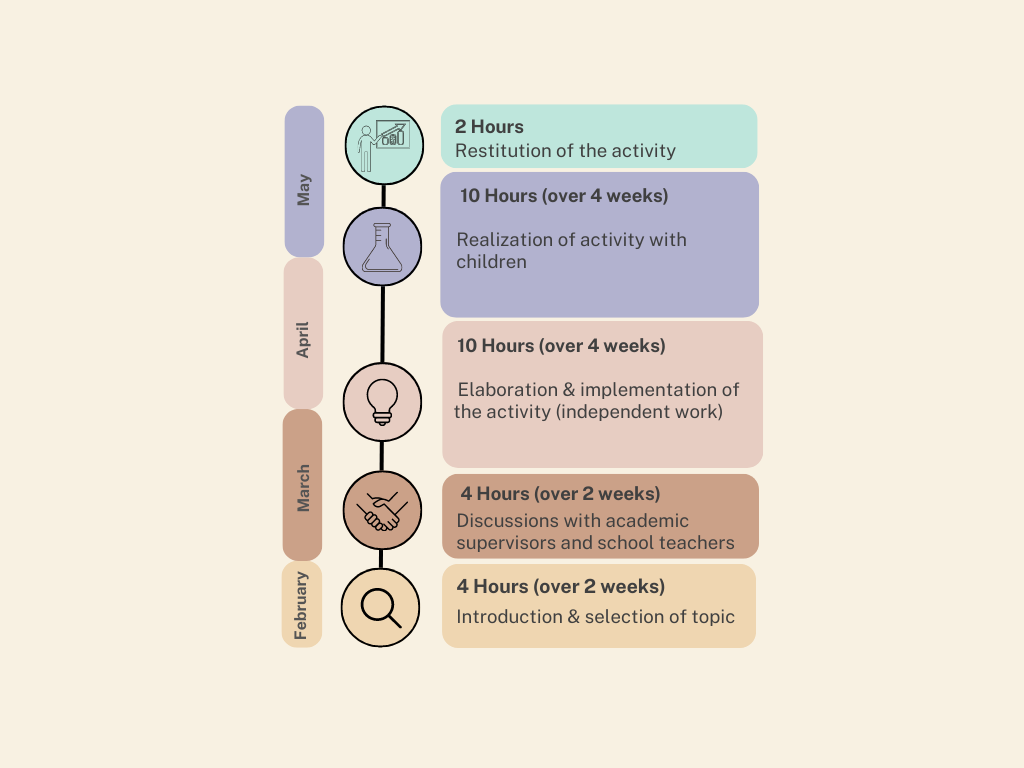Service Learning- Microbes go to school
February-May 2024 (30 hours)
First information meeting: 21.02.24 (Room A218, 12h15 to 14h00)
Venue: UniMail, local schools
5 places
Description and objectives
Objectives
Service learning is a teaching and learning strategy that links community service and instruction to enrich learning, teach civic responsibility, and strengthen community service. This approach is particularly suitable for communicating about themes of societal importance that concern both academic research and citizens. In this activity you will have the opportunity to gather the knowledge you acquired during your academic curriculum and learn how to popularize it for children aged 6 to 12, by creating fun workshops designed for kids, based on a theme related to the ecosystem services provided by microbial biodiversity. The overall aim is to enable you to get involved in local communities and to acquire new skills in communication for the general public and in teaching, while consolidating your knowledge with the aim to pass on knowledge in your turn.
Content
You will independently prepare a strategy for transmitting knowledge on a specific scientific topic to a non-specialist audience; in this case, schoolchildren in grades 3 to 8 (approximately 6 to 12 years old). The scientific subject and the way to approach it are discussed between you, the teachers of the classes concerned, and the academic supervisors in order to involve all partners. The only prerogative is to discuss what microorganisms are, their diversity and the importance of this diversity, highlighting if possible the multitude of beneficial actions they can offer to society.
More information available here: https://www.unine.ch/lamun/en/home/service-learning---les-microbes.html
Learning outcomes
- Popularize Science in a clear, accurate, and audience-specific way
- Learn how to communicate with a non-specialist audience, from children to the public
- Apply the acquired knowledge and competences through the creation of a fun activity for kids
- Critically evaluate the successful transmission of knowledge
- Work efficiently as a team
Schedule
-
The activity is spread over 3 months from mid-February to late May (30 hours over 13 weeks). The activity is split into five phases (see Fig. 1):
Phase 1: Introduction and selection of a specific topic (2h on February 21 and 2h in early March),
Phase 2: First discussions of the topic and ideas with the academic supervisors and school teachers (4h spread over 2 weeks in March, specific schedule to be defined with the different partners),
Phase 3: Elaboration and implementation of the activity (independent work representing 10 hours spread over 4 weeks between March and April),
Phase 4: Realization of the activity with children (10 periods of 45 min, spread over 2-4 weeks between April and May, specific schedule to be defined with the teachers),
and finally,
Phase 5: Restitution of the activity to peers and people involved in the program (2h in May).
-

-
Figure 1. Service learning activity schedule timeline
General information
Registration
Registration: here
Deadline: 15.02.2024
Credits
Credits: 3.0
Category: Transferable skills (T)

